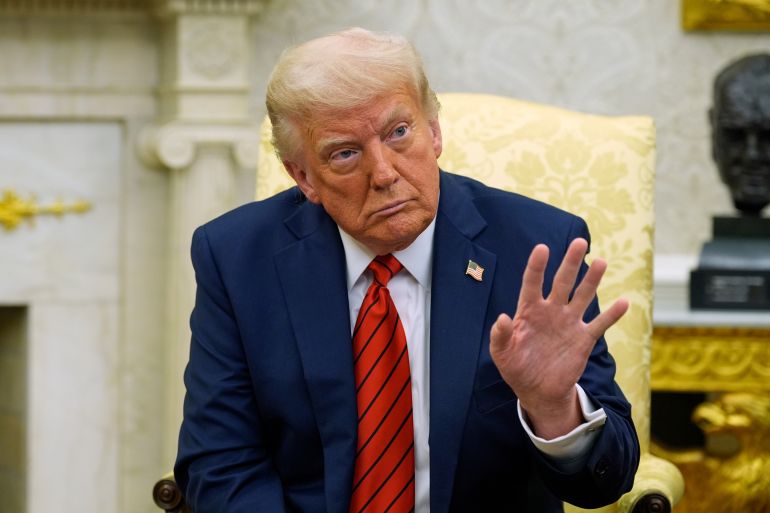Trump slams Zelenskyy’s Crimea position as UK hosts Ukraine talks
US president claims a peace deal is close, but accuses Ukrainian leader of making ‘inflammatory statements’.

Published On 23 Apr 202523 Apr 2025
US President Donald Trump has lashed out at Volodymyr Zelenskyy, accusing the Ukrainian leader of making “very harmful” statements after he pushed back on ceding occupied Crimea to Russia in a potential peace deal.
President Zelenskyy on Tuesday ruled out the idea of Ukraine ceding territory to Russia in any deal before talks on Wednesday in London among US, European and Ukrainian officials. “There is nothing to talk about – it is our land, the land of the Ukrainian people,” Zelenskyy said.
Recommended Stories
list of 3 itemsend of list
His comments came after US media reports that the Trump administration was ready to accept recognition of annexed land in Crimea as Russian territory.
In a post on the Truth Social platform on Wednesday, Trump accused Zelenskyy of stoking tension by “boasting” that Kyiv would not legally recognise ceding Crimea to Russia.
“This statement is very harmful to the Peace Negotiations with Russia,” Trump said, adding that Russia invaded the Crimean Peninsula and annexed it back in 2014 “without a shot being fired”.
Advertisement
“It’s inflammatory statements like Zelenskyy’s that makes it so difficult to settle this War,” Trump said. “He can have Peace or, he can fight for another three years before losing the whole Country.”
Earlier, US Vice President JD Vance told reporters in India that the US has “issued a very explicit proposal to both the Russians and the Ukrainians”.
“It’s time for them to either say ‘yes’, or for the United States to walk away from this process,” he added.
Vance said land swaps would be fundamental to any deal.
“That means the Ukrainians and the Russians are both going to have to give up some of the territory they currently own,” he added.
London talks
In London, the US, Ukrainian and European officials held “substantive” truce talks despite US Secretary of State Marco Rubio cancelling his trip.
Rubio’s no-show on Wednesday prompted a broader meeting with foreign ministers from Ukraine, the UK, France and Germany to be replaced by discussions at an official level, underscoring the tension between Washington, Kyiv and its European allies over Russia’s war in Ukraine.
A spokesperson for British Prime Minister Keir Starmer played down any disappointment over Rubio’s abrupt cancellation, saying the talks involved “substantive technical meetings with European, US and Ukrainian officials on how to stop the fighting” triggered by Russia’s 2022 invasion.
“We remain absolutely committed to securing a just and lasting peace in Ukraine, and these talks today are an important part of that,” the spokesperson said.
Advertisement
At the heart of Wednesday’s talks was an attempt to establish what Kyiv can possibly accept after Trump’s special envoy Steve Witkoff presented proposals that appeared to demand more concessions from Ukraine than Russia.
Reuters reported that several sources said Witkoff’s proposals included recognising Russia’s 2014 annexation of Crimea, Washington beginning to lift sanctions on Russia and ruling out Ukrainian membership of NATO.
Al Jazeera’s Zein Basravi, reporting from Kyiv, said Ukrainians found the US stance “simply unacceptable”. “Ukraine’s position is that it boggles the mind that … the US would ask an ally to give up sovereign territory of its own after an invasion,” he said.
Mattia Nelles, who heads the German-Ukrainian Bureau think tank in Dusseldorf, told Al Jazeera that Europe now finds itself in the position of drawing red lines and trying to prevent Ukraine from being “thrown under the bus”.
What was particularly worrisome to Europe was the US position on sanctions. “What the US is also throwing in the mix is sanctions relief, and this is very dangerous because it allows Russia to rearm very quickly while leaving Ukraine in a weaker position,” Nelles said, adding that this would remain unacceptable to both Kyiv and other European nations.
